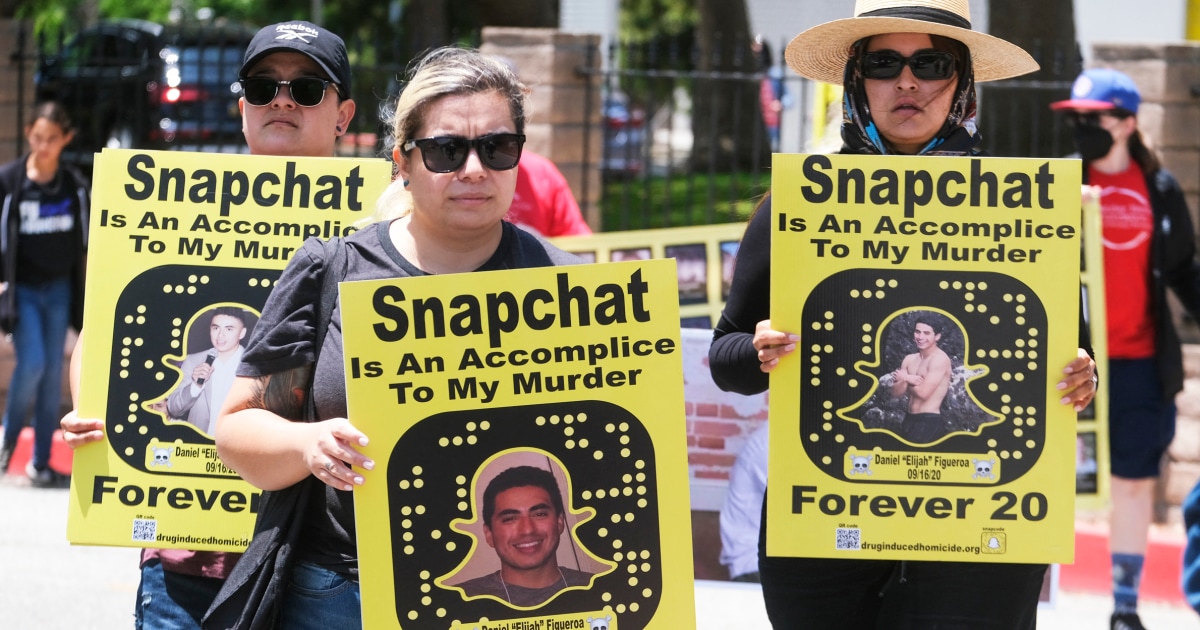The lawsuit adds that Snapchat is exceptionally hospitable to drug dealing because of this feature, but goes further to say that the company has turned a blind eye, even when notified about specific accounts associated with drug sales.
“Snap thwarts law enforcement efforts to prosecute people who use Snapchat to sell illegal drugs in any significant way,” the lawsuit states. “First, Snap notifies drug dealers when they receive a subpoena or other legal requests for their account information, giving them time to modify their actions. Second, in some cases Snap takes months to respond to requests for account information, rendering material evidence inaccessible due to Snap’s self-deletion design.»
For example, the lawsuit says, after 14-year-old Alexander Neville died in 2020 from a fentanyl-laced pill he bought through Snapchat, authorities subpoenaed the company for records related to the alleged trafficker’s account. of drugs.
It took nine months and multiple subpoenas for a response, the lawsuit says, and “even after receiving the subpoena, Snap continued to allow (the alleged dealer) to sell drugs on Snap. They did not disable or block the Snapchat distributor who sold Alexander counterfeit oxycodone, despite knowing that (the alleged distributor) was selling deadly fentanyl pills to minors through and because of their Snapchat product.”
The lawsuit says Snap’s director of global security operations told parents during a Zoom meeting in April 2021 that the reason it had taken so long to respond to the subpoenas is because his department was understaffed. Snap denies that he said that, but says that he has beefed up the staffing since then.
Snap said in its statement that «we already have zero tolerance for the sale of illicit drugs on Snapchat.»
«We deploy advanced technology to proactively detect and remove drug dealers from our platform, and we continue to strengthen our support for police investigations, including by continuing to make referrals to law enforcement with the goal of furthering an investigation.» » the statement said.
The lawsuit includes two new families, including Sam Chapman and his wife, Laura Berman, of Santa Monica, California, who lost their 16-year-old son Sammy to an overdose in February 2021.
Chapman joined the lawsuit against the company this week, telling NBC News that he has given up hope that Congress will rein in the company. Chapman is convinced Snap’s algorithm leads drug dealers to teens on the platform and says the company should do much more to stop it.
“They need to make it impossible,” he said.
The new amended complaint includes an email exchange Chapman had with Snapchat CEO Evan Spiegel, in which Chapman told Spiegel that after his son’s death, local police discouraged him from seeking information from Snap about the drug dealer.
“Our son was lying dead on the ground and we were told by the police not to wait to catch the dealer who poisoned him, because in cases where Snapchat is involved, they get no help,” Chapman wrote.
The CEO responded: “We work with law enforcement, daily, to bring criminals to justice and investigate abuse on our platform, including in the case of your son. I understand that you feel we can do better and I agree. We will always work to improve our service. But I think it’s categorically untrue that working with us is a ‘waste of time’ for law enforcement.»
The Santa Monica Police Department said in a statement at the time that it had a «collaborative» relationship with Snap.
Chapman says he plans to attend a planned protest outside Snapchat’s Santa Monica headquarters on May 12 with families who will have pictures of their children who have died from drugs they obtained on the Snap platform.
Stock records show that Snapchat has 100 million users in North America. In 20 countries, the platform reaches 90% of the population aged 13 to 24, the company says.
Worldwide, the total number of users has risen from 319 million in 2021 to 375 million in 2022, the company says.
In October, Snap launched an information campaign about the dangers of fentanyl.
The most recent transparency of the company report shows that it took 107,851 unique enforcement actions against accounts for drug-related violations from January 1, 2022 to June 30, 2022, the most recent data available.
“It is devastating that the national fentanyl epidemic has claimed the lives of so many people, and we have great empathy for the families who have suffered unimaginable losses,” the company said in its statement. “We remain deeply committed to doing our part to combat this urgent crisis, working with government officials, other technology platforms, families, and security experts.”

